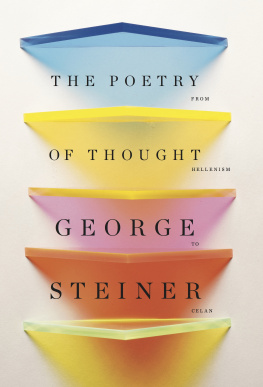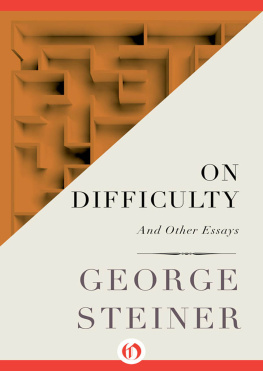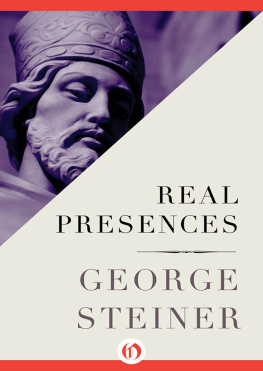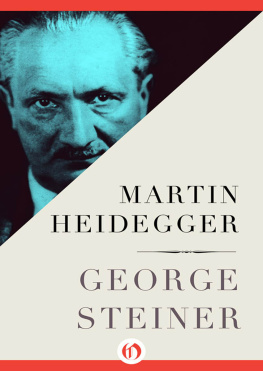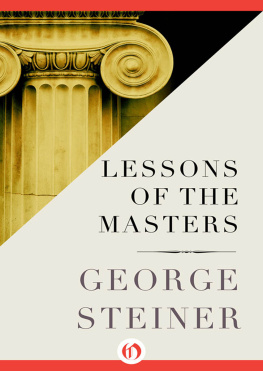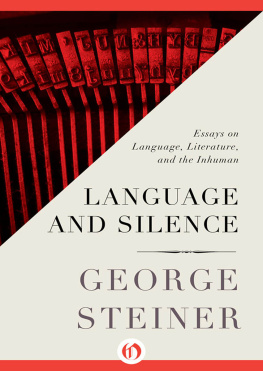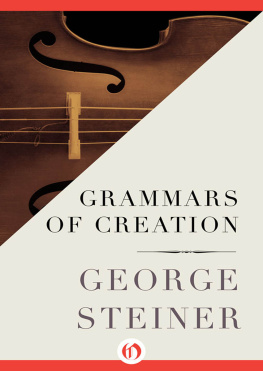Also by George Steiner
available from New Directions
My Unwritten Books
George Steiner at Th e New Yorker
Copyright 2011 GeorgeSteiner
All rights reserved. Exceptfor brief passages quoted in a newspaper, magazine, radio, television, orwebsite review, no part of this book may be reproduced in any form or by anymeans, electronic or mechanical, including photocopying and recording, or by anyinformation storage and retrieval system, without permission in writing from thePublisher.
Published by arrangement withGeorge Steiner and his agent, Georges Borchardt.
publishers note
At New Directions request, theauthor has provided translations of some of the longer passages quoted inthe original in The Poetry ofThough t .
Manufactured in the UnitedStates of America
First published as a NewDirections book in 2011
Published simultaneously inCanada by Penguin Books Canada Limited
Design by Erik Rieselbach
Library of Congress Cataloging-in-PublicationData
Steiner, George, 1929
The poetry of thought : fromHellenism to Celan / George Steiner.
p. cm.
Includes bibliographicalreferences and index.
ISBN 978-0-8112-1945-7 (hardback: acid-free paper)
1. Literature and philosophy. 2.Philosophy in literature. I. Title.
PN49.S74 2011
801dc23
2011037840
1 3 5 7 9 10 8 6 4 2
New Directions Books arepublished for James Laughlin
by New Directions PublishingCorporation
80 Eighth Avenue, New York, NY10011
The Poetry of Thought
From Hellenism to Celan
George Steiner
A New Directions Book
For Durs Grnbein
Poet & Cartesian
Toutepense commence par un pome.
(Every thought begins with a poem.)
Alain: Commentaire sur La Jeune Parque , 1953
Il y atoujours dans la philosophie une prose littraire cache, une ambigut destermes.
( Th ere is always inphilosophy a hidden literary prose, an ambiguity in the terms used.)
Sartre: Situations IX , 1965
On ne penseen philosophie que sous des mtaphores.
(In philosophy one thinks only metaphorically.)
Louis Althusser: lments dautocritique , 1972
Lucretius and Seneca are models ofphilosophical-literary investigation, in which literary language and complexdialogical structures engage the interlocutors (and the readers) entire soulin a way that an abstract and impersonal prose treatise probably could not.... Form is a crucial element in the works philosophical content. Sometimes,indeed (as with the Medea ), the content of theform proves so powerful that it calls into question the allegedly simplerteaching contained within it.
Martha Nussbaum: Th e Th erapy ofDesire, 1994
Gegenber den Dichtern stehen diePhilosophen unglaublich gut angezogen da. Dabei sind sie nackt, ganzerbrmlich nackt, wenn man bedenkt, mit welch drftiger Bildsprache sie diemeiste Zeit auskommen mssen.
(In contrast to the poets, the philosophers lookincredibly elegant. In fact, they are naked, piteously naked when one considersthe meager imagery with which they have to make do most of the time.)
Durs Grnbein: Das erste Jahr , 2001
Preface
What are the philosophic concepts of the deaf-mute? What arehis or her metaphysical imaginings?
All philosophic acts, every attempt to think thought, with thepossible exception of formal (mathematical) and symbolic logic, are irremediablylinguistic. They are realized and held hostage by one motion or another ofdiscourse, of encoding in words and in grammar. Be it oral or written, thephilosophic proposition, the articulation and communication of argument aresubject to the executive dynamics and limitations of human speech.
It may be that there lurks within all philosophy, almostcertainly within all theology, an opaque but insistent desireSpinozasconatusto escape from this empowering bondage. Either bymodulating natural language into the tautological exactitudes, transparenciesand verifiabilities of mathematics (this cold but ardent dream haunts Spinoza,Husserl, Wittgenstein) or, more enigmatically, by reverting to intuitions priorto language itself. We do not know that there are any such, that there can bethought before saying. We apprehend manifold strengths of meaning, figurationsof sense in the arts, in music. The inexhaustible significance of music, itsdefiance of translation or paraphrase, presses on philosophic scenarios inSocrates, in Nietzsche. But when we adduce the sense of aestheticrepresentations and musical forms, we are metaphorizing, we are operating bymore or less covert analogy. We are enclosing them in the mastering contours ofspeech. Hence the recurrent trope, so urgent in Plotinus, in theTractatus, that the nub, the philosophic message lies in that whichis unsaid, in the unspoken between the lines. What can be enunciated, whatpresumes that language is more or less consonant with veritable insights anddemonstrations, may in fact reveal the decay of primordial, epiphanicrecognitions. It may hint at the belief that in an earlier, Pre-Socraticcondition, language was closer to the wellsprings of immediacy, to the undimmedlight of Being (so Heidegger). But there is no evidence whatever for any suchAdamic privilege. Inescapably, the language-animal, as the ancient Greeksdefined man, inhabits the bounded immensities of the word, of grammaticalinstruments. The Logos equates word with reason in its veryfoundations. Thought may indeed be in exile. But if so, we do not know or, moreprecisely, we cannot say from what.
It follows that philosophy and literature occupy the samegenerative though ultimately circumscribed space. Their performative means areidentical: an alignment of words, the modes of syntax, punctuation (a subtleresource). This is as true of a nursery rhyme as it is of a KantCritique. Of a dime novel as of the Phaedo. They are deedsof language. The notion, as in Nietzsche or Valry, that abstract thought can bedanced is an allegoric conceit. Utterance, intelligible enunciation is all.Together they solicit or withstand translation, paraphrase, metaphrase and everytechnique of transmission or betrayal.
Practitioners have always known this. In all philosophy,conceded Sartre, there is a hidden literary prose. Philosophic thought can berealized only metaphorically, taught Althusser. Repeatedly (but howseriously?) Wittgenstein professed that he ought to have set down hisInvestigations in verse. Jean-Luc Nancy cites the vitaldifficulties which philosophy and poetry occasion each other: Together they aredifficulty itself: the difficulty of making sense. Which idiom points to theessential crux, to the creation of meaning and poetics of reason.
What has been less clarified is the incessant, shaping pressureof speech-forms, of style on philosophic and metaphysical programs. Inwhat respects is a philosophic proposal, even in the nakedness of Freges logic,a rhetoric? Can any cognitive or epistemological system be dissociated from itsstylistic conventions, from the genres of expression prevalent or underchallenge in its time and milieu? To what degree are the metaphysics ofDescartes, of Spinoza or Leibniz conditioned by the complex social andinstrumental ideals of late Latin, by the constituents and underlying authorityof a partially artificial Latinity within modern Europe? At other points, thephilosopher sets out to construe a new language, an idiolect singular to hispurpose. Yet this endeavor, manifest in Nietzsche or in Heidegger, is itselfsaturated by the oratorical, colloquial or aesthetic context (witness theexpressionism in Zarathustra). There could be no Derrida outside thewordplay initiated by Surrealism and Dada, immune to the acrobatics of automaticwriting. What lies nearer deconstruction than Finnegans Wake orGertrude Steins lapidary finding that there is no there there?
Next page
